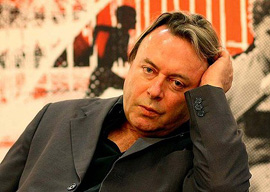
December 21, 2011

Christopher Hitchens
Hitchens went on to write for The Atlantic about W. Somerset Maugham, John Buchan, Ian Fleming, Philip Larkin, and Evelyn Waugh. In other words, Hitchens lauded the kind of writers who don’t intimidate journalists, which explains a bit about the disproportionate adulation he’s received in the press over the last week.
Hitchens didn’t show much interest in avant-garde or academic books. Instead, he succored the media’s resentment of academia. The press doesn’t really like Ulysses, much less Finnegan’s Wake. They are bored by The Faerie Queene. What they truly enjoy is, say, Waugh’s Scoop, for which Hitchens wrote an introduction in 2000. Scoop is a superbly done 1938 send-up of foreign correspondents rushing to cover the Abyssinian War. Now that’s a classic. (Hey, I’ve read it eight or nine times.) And Hitchens was there practically every month in The Atlantic to tell other journalists that the stuff they liked was great literature.
Hitchens’s favorites were Englishmen who wrote lucid prose, made some money over a long professional career, and who hung out with other famous writers enough that there’s a vast web of reminiscence for him to mine.
As a literary critic, Hitchens benefited from not having much aesthetic ambition. Most reviewing is done by people who want to write creative literature, but Hitchens’s prosaic turn of mind drove him to look instead for interesting conversational topics.
Hitchens had a wonderful memory. While his own writing was too verbose and self-satisfied to be terribly quotable itself (although his ad hoc quips could be amusing in a “But in the morning, madam, I’ll still be drunk” sort of way), he could always dredge up a lively quote or an amusing biographical connection with another famous author, even if he didn’t know when to stop with the middlebrow erudition.
Hitchens made a great to-do over positioning himself as the second coming of that secular saint George Orwell, but in his social climbing, name-dropping, and bisexual Brideshead Revisited-like years at Oxford, he resembled Waugh. In fact, Hitchens emulated Waugh’s recurrent character Basil Seal, antihero of Black Mischief and Put Out More Flags, an adventurer and rogue whose vices distract attention from his deep vein of didacticism.
There was something slightly mechanistic about how Hitchens worked up his essays on literature. For example, Hitchens’s Wodehouse column devoted much attention to the non-topic of his subject’s politics. He also speculated freely on Wodehouse’s sex drive (if any). Not surprisingly, both Orwell and Waugh are cited twice. This all might seem to be rather laboriously missing the point of the great comic prose stylist. But journalists’ chief interests are politics, gossip, and other journalists, and Hitchens knew that better than anyone.